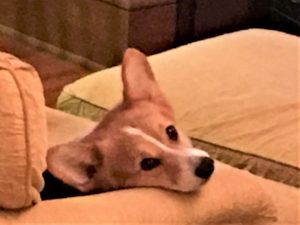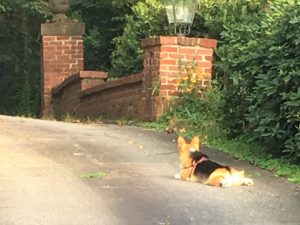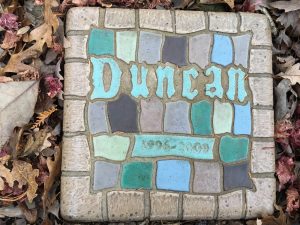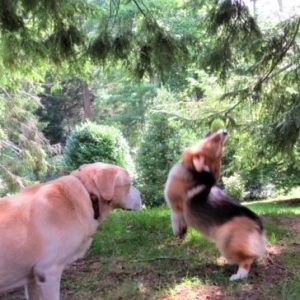
By Scott Riviere, North Carolina
My partner, Robert, and I had a small Pembroke Welsh corgi named Duncan. About six months after Duncan passed, we decided to search for a reddish-brown-and-white corgi puppy. Duncan had been tricolor—red, black, and white. We didn’t want to replace him with another dog of the same coloring. That way, the new puppy would be able to make his own place in our hearts without always reminding us of our beloved Duncan.
The ECK, Divine Spirit, guided us to a wonderful place where we could meet a litter of four-week-old corgi puppies. The woman who bred them brought the mother and the puppies to us, and Robert and I sat on the grass with the dogs between us.
Grown corgis have big ears that stick straight up, but a corgi puppy’s ears lie flat, giving little four-week-old corgis the appearance of guinea pigs. This litter included five red-and-white puppies and two tricolors. Except for one, none of them moved while we watched them; they just lay in the sun and slept.
I noticed the smallest tricolor puppy of the litter was super active, with one ear up and the other down. While his littermates slept, he waddled across the grass to Robert and looked up at him. Then this tiny puppy determinedly turned around, passed by his sleeping siblings, and came to visit, fixing on me with a sweet gaze.
“But we’re looking for a red-and-white puppy,” I sympathetically told the little fellow.
Obviously not getting his message through, the puppy turned around, again crossed to the other side, rolled over on to his back, and looked up at Robert. Then he headed back toward me and wiggled his tiny body underneath my hand. I acknowledged him with a petting, thinking he was cute. But he wouldn’t let up. Repeatedly he traveled back and forth between the two of us.
After forty-five minutes of his maneuver, the woman asked us if we’d made a decision about which pup to choose. Robert and I looked at each other. “I think it’s the little tricolor with one ear up and one ear down,” I conceded.
Two Weeks Later
In a couple of weeks I returned to pick up the persistent puppy. The other pups were awake that day, wandering around in a big box on the table. The only one standing on his hind legs, looking over the top of the box, now with both ears up and staring at me, was the little guy I’d be bringing home. He couldn’t seem to take his eyes off me. The whole time I was there, this pup was the only one standing up and staring at me.
The woman said, “He’s never been separated from the litter. He’ll be very noisy going home.”
Fully expecting an uproar, I put the puppy in a little carrier next to me in the car. During the drive I stuck my fingers through the carrier door to assure him. But he was perfectly happy and quiet.
At home, I thought he would cry through the first night away from his litter, but after I took him outside once to relieve himself, he never made a sound. He slept the entire night peacefully, in the carrier, by my bed.
We named our new family member Porter. It was the name that came to me while I drove the puppy home.
Familiar Territory
In the following days, whenever Porter was downstairs, he seemed interested in climbing up the stairs. It was as if he knew his way around the house, because he always wanted to go up to the next step. It was as if everything seemed familiar to him.
One day Robert and I were watching television upstairs. I lay on the couch, and Porter was playing on the floor. Robert said, “I’m going to go downstairs for a minute.”
I was reminded that whenever I’d lie on the couch when we had Duncan, his favorite position was to scoot to the end of the couch, put his head on the armrest, and spread his back legs out flat. I called it the “corgi rug.”
Before Robert went downstairs, he placed the little puppy on the couch with me. Porter immediately hurried to its end, tried to put his little head up on the high armrest, and spread his back feet into corgi-rug pose. While we watched Porter imitate Duncan’s classic move, tears came to Robert’s eyes. We never thought we’d see Duncan’s couch-armrest position again. And yet here it was.
“I’m Back.”
We live on a mountainside, and our lawn stretches down a hill to a forested area. When Robert and I took Porter outside, he always stayed nearby, within a few feet.
The day after Porter assumed the corgi-rug pose, we took him for his regular potty break and expected him, as usual, to stay near us. But suddenly he ran off. He headed down the hill, and we followed after him. Although Porter had never been down that hill, it looked as if he was heading toward the woods. At the wood’s edge, we had placed a flat, square marker for Duncan’s grave.
Instead of running into the woods, Porter ran directly to that marker, climbed onto the tiles that covered it, and sat with his ears straight up, staring up at us. The marker was engraved with Duncan’s name and the dates of his birth and death. Now it served as a backdrop to the puppy. As we took in the sight of Porter sitting on Duncan’s grave and framed by his tombstone, we started to say to each other, “Maybe Duncan really is back with us.”

Soul Recognizes Soul
One of my fondest memories of Duncan was how lovingly he raised our yellow Labrador retriever, Miles, from puppyhood. I always referred to Miles as the walking heart. All I needed to do was walk into a room and say, “Miles, I need a hug.” I’d drop down on my knees, and he’d come over, stand on his hind legs, and place his paws on my shoulder, and I would embrace him. Every morning, he’d be by my bed. I’d automatically drop down on my knees to start my day with one of his hugs.
Because corgis are herding dogs, Duncan devised a favorite game he and Miles played with each other. Duncan would bark twice to get Miles’s attention. Miles would start to trot. Duncan would run after and herd Miles as the two dogs ran around the property. After Duncan passed away, Miles was depressed and missed his best buddy.
 On the seventh day after Porter’s arrival, we let the two dogs go outside. Just as Duncan used to do, Porter looked up at Miles and let out a couple of high-pitched puppy barks. Miles moved forward. Little six-week-old Porter charged after him. The dogs were playing Duncan’s and Miles’s favorite herding game.
On the seventh day after Porter’s arrival, we let the two dogs go outside. Just as Duncan used to do, Porter looked up at Miles and let out a couple of high-pitched puppy barks. Miles moved forward. Little six-week-old Porter charged after him. The dogs were playing Duncan’s and Miles’s favorite herding game.
From that point on, it was as if Miles returned to life. He was a different dog. He had aged when Duncan died, and now he was young again. Miles and Porter formed the same relationship as Miles had had with Duncan. They played the herding game for years.
From Duncan and Porter, I had my own experience with Soul as an eternal being. Soul is eternal. Love is eternal. Soul wants to come back into Its loving relationships with other Souls and reunite with them in the physical as well as in the higher worlds.
—Photos by Scott Riviere

Oh my goodness. Not being able to sleep, I decided to read some of the animal stories posted. It is truly amazing how Porter knew everything so well about his, supposedly, new home. His actions reminded me of a Cocker Spaniel that came into my life soon after my Cavalier King Charles had translated close to fifteen years of age. When she passed I was so heartbroken, and thought life would never be happy again. During a spiritual excercise I had asked for a sign to please let me know how she was in her new heaven. Immediately, the brightest speck of white light went from a pinpoint to the size of a dinner plate, accompanied by the most heavenly music I have ever heard. In an instant it was clear to me she had arrived and was well taken care of on the other side. A day or two later, I awoke in the middle of the night and heard a voice say “Call the Vet” which I was not sure why. Then it occurred to me it was a source for another pet. Almost with reluctance I called and asked if they had any clients who had puppies. In the background I could hear my vet tell his assistant to give me a certain person’s phone number. It turned out that this family had two very young dogs that had produced a litter of six The woman had the same fist name as me, and her husband had the same occupation as my husband. When we saw the puppies, I picked up one and held it, telling my husband It was a very special pup. He was not to excited one way or another. The pups went to their new homes at six weeks, because their mother stopped nursing them at two weeks of age. They had been raised on goat milk and baby rice cereal. We picked her up and she smelled like a barnyard. When she came into our house she seemed to now it all, and wanted to be held like a baby. Before you could get settled, she was up in our arms and had turned upside down, where she stayed until she was ready to get down. Not long after bringing her home, I found out she had been born two days after burying my Cavalier at the Pet Cemetary. In fact, the timing was when someone had rear ended my car on the way down to visit the grave. A couple of months later I took her and her pal on leash to visit with me at the grave site. Several yards away, she started whining and pulling on her leash, directing me to the grave of my beloved dog. What a wonderful opportunity to speculate all the possibilities. Thank you for sharing about your loving and special experience of Porter.
This made my heart so full and made me cry. My husband and I just lost our 8 month old Corgi to a tragic, unforeseen and sudden illness. We are obviously not ready for a new love yet, but when we are, we want another Corgi because we felt like we were cheated out of a full, beautiful life with ours. I sincerely hope Finn’s soul comes back in another form. I miss him so.
You don’t know how lucky you are I would do anything to have a corgi my corgi passed and I have no money to get another I cry for her everyday she was the sweetest girl ever her name was Sadie she was also red I would take any color even purple lol love youre corgi for me
It’s so nice to hear animals credited with mindfulness, even spiritual insight better than most humans. My pets are perennial flowers, but I go out of my way to encounter wild animals and witness their behavior, thoughtfulness, and emotions. Thanks for the story.
I took one look at the photo and thought, “Boy that looks like Porter.”
Great story Scott.
This story brought tears of joy to my heart. What a wonderful story of animal soul returning to loved ones again.
So wonderful to see how others have experienced the return of their beloved pets. I too have had the same experience with my cat. Bob cat used to wake me up from my naps with a swat from his tail to my face! He sat on my dresser by my bed and dangled his tail down to wake me up. When he translated I waited 2 years to get another cat. We ended up with Eva who not only wakes me with her tail swats but she eats flowers and electrical cords for fun. So happy Bob cat is back! Now I am not afraid to lose a pet because I know they will return to me if it is their love I need!
I love how persistent Porter was to convince you to bring him home, and to so clearly demonstrate that he was Duncan, returned. What a happy story for your whole family, both four- and two-legged!
Such a touching story, lovingly told–and also a great demonstration of how to listen for the spiritual messages that speak beneath the surface of our involvements with our animal friends.
(If I have a story that might fit your blog, to whom would I send it?)
Some really specific examples of how we know that we know when a beloved friend has chosen to live with us again in a new life form – great reading your stories!
What a wonderful story. Thank you for writing this…..it’s all about love.
I had wanted a dog all my life, but my parents were not animal lovers. So, soon after buying my first house, I got a puppy, Andy the Westie. I was single and worked long hours, and wanted Andy to have company while I was not home, so several months later I got another puppy, Tasha the Rottweiler. They became the loves of my life, and were with me through everything, including a lot of traveling, and living in four different cities. After many years I settled down, and finally met my wife. Andy and Tasha died within a few months, they were both very old, but I think they hung on until my next love was with me. In the several years that followed, we had three wonderful dogs – one passed away (another Rottweiler named Karl) and the other two were very old. I wanted to get a puppy, figuring that there was time in my life to raise and care for one more puppy. We went to an adoption event and met a lady who had a litter of pups for adoption. She had rescued their mother, a pregnant black Daschund, from a high-kill shelter, and raised them lovingly until they were old enough to go to their new homes. I was immediately attracted to one of them, Teddy, who had Rottweiler markings, long legs, and the slightly wavy hair down his back sometimes seen on Rotties. We still had two senior Westies at home, who were kind to Teddy, but did not play with him. A few weeks later, at my wife’s suggestion and my surprise, we adopted one of Teddy’s sisters, Kate. Kate was the companion that Teddy needed, and the two were instantly bonded. It didn’t dawn on me for many months that Teddy and Kate are very likely Tasha and Andy returned (at least I like to think so). I told Andy and Tasha to come back to me if they wanted because I always want them to be with me, in what ever body they choose 🙂
Thank you Scott for your wonderful animal stories. I enjoy reading them.